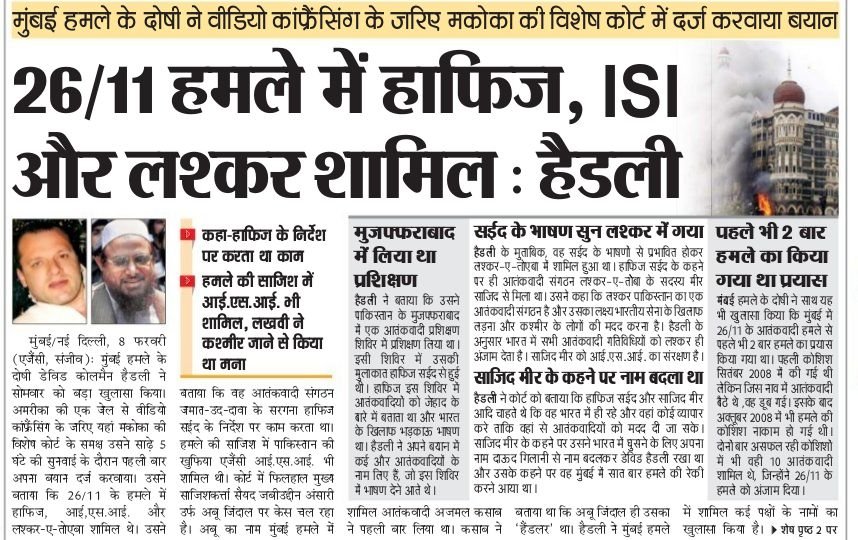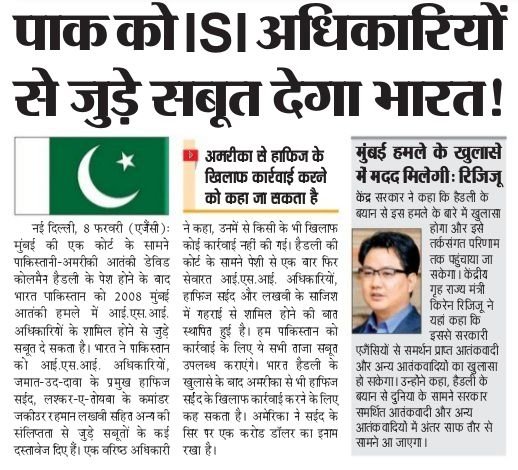Deposition strengthens demand for faster trial in Pak, Saeed’s indictment
MUMBAI: Lashkar-e-Taiba (LeT) operative David Coleman Headley told a court on Monday that he was in touch with Pakistani spy agency officers before the 26/11 Mumbai attacks and that the militant group chief Hafiz Saeed knew about the deadly plan.
Deposing via video conference from the United States, Headley also said he visited India seven times to identify terror targets and revealed terrorists tried to attack Mumbai twice before 26/11 but failed on both occasions. In one instance, their boat hit some rocks and sank in the sea, taking down with it a cache of guns and grenades.
Monday’s deposition is the first by the 56- year- old US national in an Indian court and will be admissible as evidence in the trial against another key 26/11 accused Zabiuddin Ansari alias Abu Jundal. He had made similar revelations in a US court and to the National Investigation Agency.
The testimony may also help Indian authorities put together a fresh dossier of evidence, and strengthen New Delhi’s demand that Islamabad speed up its trial into the 26/11 attack, including the role of Saeed who Pakistan has refused to indict.
“It is clear, we think, that there was a close nexus between ISI and LeT. That is what has been gathered from the revelations made from Mr Headley,” said public prosecutor Ujjwal Nikam outside the court in Mumbai.
Headley’s deposition is unlikely to hurt efforts between New Delhi and Islamabad to revive peace talks after the attack on an Indian airbase last month.
India says Saeed was the brain behind the multiple terror strikes that hit two luxury hotels, a popular café, a Jewish centre and Mumbai’s main railway station, killing 166 people.
Headley called Saeed his inspiration, named his close associate Zakiur Rehman Lakhvi, and told the court details of terror camps he attended in Pakistan-occupied Kashmir’s Muzaffarabad since 2002.
For two years, he was given leadership training, how to handle AK-47 assault rifles, bombs and explosives. Headley said 10 terrorists were to strike in the first attempt in September 2008, but their boat hit some rocks in the Arabian Sea, resulting in loss of weapons and ammunition, but those on board survived as they wore life jackets.
The second attempt came in October, with the same people involved as in the first, but that also failed for unknown reasons, before the third and successful attack was executed on November 26, he said. Headley, who has been sentenced to 35 years in prison in the US, was granted conditional pardon by a Mumbai court in December in return for a deposition. Monday’s testimony brought into focus the role played by Pakistani authorities – especially the Inter Services Intelligence.
Headley said though his sole contact in the LeT was Sajid Mir, he was also in touch with an ISI agent he called Major Ali.
Headley told judge GA Sanap that he came in contact with the ISI officer after he was arrested along with a retired Pakistani military officer, Major Abdul Rehman Pasha, at Landi Kotal along the Afghanistan border in the Federally Administered Tribal Area.
Headley said Major Ali introduced him to one Major Iqbal as the former thought that the US national could be used to gather intelligence in India. Headley, according to his deposition before the court, changed his name from Syed Daood Salim Gilani to David Coleman Headley in Philadelphia in order to conceal his identity and also obtained a passport in the new name, as instructed by Mir.
He said he gave false information while applying for a visa at the Indian consulate in Chicago and later took the help of his friend and former Pakistani army doctor, Dr Tahawwur Husain Rana, and his partner Raymond Sanders to obtain a five-year business visa with multiple entries.


